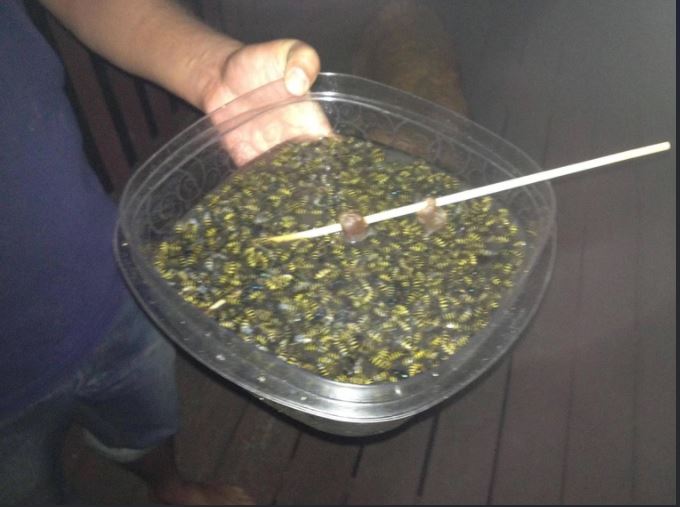Hi,
I have not had a good year. I have lost two hives to sparrows. These birds were taking bees at around eight a minute, and there was nothing I could do to stop them. They preferred taking them off the landing board and were qeueing up at both ends of it to do so, but they would take them on the wing if efforts were made to keep them away from the board. Bullets and mesh did not deter. Quite the routine. Watch, snatch, fly 10 feet or so, knock out sting, and away.
This left me with two hives which were doing quite well until about 48 hours ago. Then both hives were annihilated by wasps. These wasps, arrived suddenly and in enormous numbers. They were were not interested in the honey, but in the bees themselves. Jump on bee's back, head off, turn, abdomen off, legs off and away with the thorax. In both cases two well-filled hives were reduced to empty boxes with honey and brood in place in not much more than 24 hours, but each with a large pile of fresh heads, abdomens and legs on the baseboard and scattered around. The hives were sound and closed down. The wasps ignored sugar traps etc.
The Web seems to offer no descriptions or prescriptions for incidents like these. All other examples seem to involve politer predators. I now have nothing - but before I start again - does anybody have any suggestions? I am based on the Taieri.
Rob
I have not had a good year. I have lost two hives to sparrows. These birds were taking bees at around eight a minute, and there was nothing I could do to stop them. They preferred taking them off the landing board and were qeueing up at both ends of it to do so, but they would take them on the wing if efforts were made to keep them away from the board. Bullets and mesh did not deter. Quite the routine. Watch, snatch, fly 10 feet or so, knock out sting, and away.
This left me with two hives which were doing quite well until about 48 hours ago. Then both hives were annihilated by wasps. These wasps, arrived suddenly and in enormous numbers. They were were not interested in the honey, but in the bees themselves. Jump on bee's back, head off, turn, abdomen off, legs off and away with the thorax. In both cases two well-filled hives were reduced to empty boxes with honey and brood in place in not much more than 24 hours, but each with a large pile of fresh heads, abdomens and legs on the baseboard and scattered around. The hives were sound and closed down. The wasps ignored sugar traps etc.
The Web seems to offer no descriptions or prescriptions for incidents like these. All other examples seem to involve politer predators. I now have nothing - but before I start again - does anybody have any suggestions? I am based on the Taieri.
Rob



